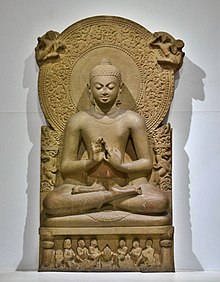You are currently logged-out. You can log-in or create an account to see more talks, save favorites, and more. more info
Buddha Talks

Siddhartha Gautama, most commonly referred to as the Buddha (lit. 'the awakened one'), was a wandering ascetic and religious teacher who lived in the eastern Indo-Gangetic Plains during the 6th or 5th century BCE and founded Buddhism. According to Buddhist legends, he was born in Lumbini, in what is now Nepal, to royal parents of the Shakya clan, but renounced his home life to live as a wandering ascetic. After leading a life of mendicancy, asceticism, and meditation, he attained nirvana at Bodh Gaya in what is now Bihar, India. The Buddha then wandered through the lower Indo-Gangetic Plain, teaching and building a monastic order (sangha). Buddhist tradition holds he died in Kushinagar (in modern day Uttar Pradesh, India) and reached parinirvana ("final release from conditioned existence").
According to Buddhist tradition, the Buddha taught a Middle Way between sensual indulgence and severe asceticism, leading to freedom from ignorance, craving, rebirth, and suffering. His core teachings are summarised in the Four Noble Truths and the Noble Eightfold Path, a training of the mind that includes ethical training and kindness toward others, and meditative practices such as sense restraint, mindfulness, dhyana (meditation proper). Another key element of his teachings are the concepts of the five skandhas and dependent origination, describing how all dharmas (both mental states and concrete 'things') come into being, and cease to be, depending on other dharmas, lacking an existence on their own (svabhava).
While in the Nikayas, he frequently refers to himself as the Tathāgata; the earliest attestation of the title Buddha is from the 3rd century BCE, meaning 'Awakened One' or 'Enlightened One'. His teachings were compiled by the Buddhist community into the Vinaya Piṭaka, containing codes for monastic discipline, and the Sūtra Piṭaka, a collection of discourses attributed to him. These were passed down in Middle Indo-Aryan dialects through an oral tradition. Later generations composed additional texts, such as systematic treatises known as Abhidharma, biographies of the Buddha, collections of stories about his past lives known as Jataka tales, and additional discourses, i.e., the Mahāyāna sūtras.
Buddhism evolved into a variety of traditions and practices, represented by Theravāda, Mahāyāna and Vajrayāna, and spread beyond the Indian subcontinent. While Buddhism declined in India, and mostly disappeared after the 8th century CE due to a lack of popular and economic support, Buddhism has grown more prominent in Southeast and East Asia.
| Title | Speaker | |
|---|---|---|
Vows In Action: Zen Unveiled Buddha, Practice |
Aug 21 2007 |
|
Dissolving Duality Through Zen Veneration Buddha, Lotus Sutra, Consciousness |
Jul 28 2007 Afternoon |
|
Embracing Emptiness with Gracious Attention Emptiness, Practice, Buddha |
Jul 14 2007 Morning |
|
Awakening Through Mindful Storytelling Buddha, Practice, Lotus Sutra |
May 26 2007 AM No Abode Hermitage |
|
Finding Light Beyond Darkness Suffering, Meditation, Buddha |
May 04 2007 Part 1 |
|
Silent Bond of Enlightened Connection Enlightenment, Meditation, Buddha |
Apr 25 2007 |
|
Boundless Enlightenment in Shared Silence Enlightenment, Buddha, Consciousness |
Mar 10 2007 AM No Abode Hermitage |
|
Embracing the Unseen Light Within Love, Buddha, Practice |
Mar 10 2007 PM No Abode Hermitage |
|
Silent Unity: The Path Within Enlightenment, Buddha, Practice |
Feb 17 2007 A Houston Zen Center |
|
Embodying Buddha Beyond Distinctions Practice, Precepts, Buddha |
Feb 17 2007 B Houston Zen Center |
|
Hearing the Dharma, Transformative Path Buddha, Enlightenment |
Feb 16 2007 A Houston Zen Center |
|
Living Zen: Practice as Enlightenment Practice, Buddha, Enlightenment |
Feb 14 2007 |
|
Questions Over Stories: Embrace Uncertainty Buddha, Equanimity, Practice |
Jan 22 2007 |
|
2007.01.19-serial.00117D Time, Buddha, Practice |
Jan 19 2007 |
|
2007.01.19-serial.00117E Dogen, Buddha, Time |
Jan 19 2007 |
|
2007.01.18-serial.00117B Dogen, Buddhism, Buddha |
Jan 18 2007 |
|
2007.01.18-serial.00117C Dogen, Practice, Buddha |
Jan 18 2007 |
|
2007.01.17-serial.00116H Buddha, Practice, Bodhisattva |
Jan 17 2007 |
|
2007.01.16-serial.00116F Time, Buddha, Dogen |
Jan 16 2007 |
|
2007.01.16-serial.00116G Buddha, Practice, Nirvana |
Jan 16 2007 |
|
2007.01.15-serial.00116D Buddha, Time, Practice |
Jan 15 2007 |
|
2007.01.15-serial.00116E Buddha, Practice, Dogen |
Jan 15 2007 |
|
2007.01.14-serial.00116B Buddha, Lotus Sutra, Dogen |
Jan 14 2007 |
|
2007.01.14-serial.00116C Buddha, Dogen, Time |
Jan 14 2007 |
|
2007.01.13-serial.00116A Buddha, Desire, Dependent Origination |
Jan 13 2007 |